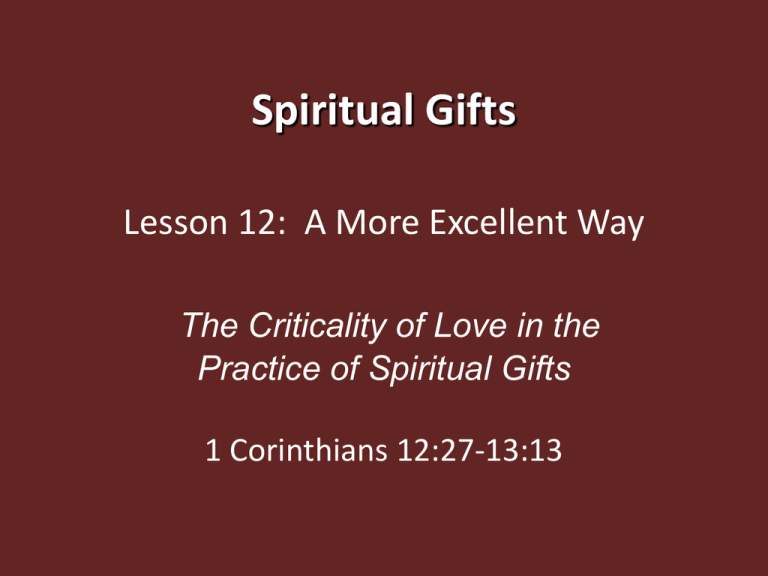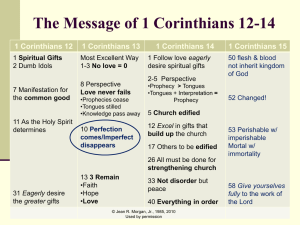Powerpoint Document
advertisement

Spiritual Gifts Lesson 12: A More Excellent Way The Criticality of Love in the Practice of Spiritual Gifts 1 Corinthians 12:27-13:13 1 Cor 13 is in our pop culture A Google search on “love is patient, love is kind” generates 152,000 hits (one for every 1,800 people in the U.S.) You can send this e-card to someone… WWW.SunnyCorner.com 1 Cor 13 Sells Merchandise WWW.CafePress.com 1 Cor 13 is used for Marriage Advice WWW.Books.Google.com 1 Cor 13 is applied to Friendship http://www.christianbook.com/Christian/Books/product?item_no=14887&event=CF 1 Cor 13 is embraced by Bloggers http://www.marcgunn.com/2006/10/love-is-patient-love-is-kind.shtml 1 Cor 13 is used as a political prop http://blog01.kintera.com/christianalliance/archives/2006/01/love_is_patient.htm l I. Introduction: A. 1 Corinthians 13 seems to be everywhere B. The world and the church seem equally comfortable with this text C. The applications of this text vary but very few involve the exercise of spiritual gifts What is the Biblical context of 1 Cor 13? II. Outline: A. Context (Comparison to other spiritual gift texts, 1 Cor 1-12, and 1 Cor 12:31) B. The criticality of love in the exercise of spiritual gifts (13:1-3) C. The description of love in the church (13:4-7) D. The primacy of love over spiritual gifts (13:8-13) E. Practical suggestions III. The Context of 1 Corinthians 13 A. Romans 12:1-8 is followed by 12:9-16 which describe how members of the body should treat one another: V. 9 Let love be without hypocrisy. V. 10 Be devoted to one another in brotherly love… Paul uses similar terms and makes similar points regarding love in Romans 12 and in 1 Corinthians 13. Perhaps instructing the church to exercise spiritual gifts without further explanation is somehow incomplete… III. The Context of 1 Corinthians 13 A. Romans 12:1-8 and 12:9-16 B. 1 Corinthians chapters 1-12 A.The structure of the book is deliberate B.Paul seeks to verbally re-construct the church from the ground up: Ch 13 Love Ch 12 Spiritual gifts Ch 11 The mtg of the church Ch 8-10 Rights and weaker brothers Ch 7 Family structure, marriage and divorce Ch 5-6 Morality, fixing their witness to the world Ch 1-4 Reestablishing Christ Jesus as THE foundation III. The Context of 1 Corinthians 13 A. Romans 12:1-8 and 12:9-16 B. 1 Corinthians chapters 1-12 C. 1 Corinthians 12:31 A. Paul’s work in chapters 1-12 have put the church on a sound footing B. Verse 31 provides the context for chapter 13: But earnestly desire the greater gifts. And I show you a still more excellent way. (emphasis mine) C. There is something more valuable, more important than properly understanding and exercising spiritual gifts – even the greater gifts… IV. The criticality of love (13:1-3) If I speak with the tongues of men and of angels, but do not have love, I have become a noisy gong or a clanging cymbal. 2 If I have the gift of prophecy, and know all mysteries and all knowledge; and if I have all faith, so as to remove mountains, but do not have love, I am nothing. 3 And if I give all my possessions to feed the poor, and if I surrender my body to be burned, but do not have love, it profits me nothing. NASU A. General Observations • • • • Paul offers no proof and speaks in first person Paul employs hyperbole The issue is the absence of love when gifts are being exercised The consequences are very serious IV. The criticality of love (13:1) If I speak with the tongues of men and of angels, but do not have love, I have become a noisy gong or a clanging cymbal. NASU • “Glossa” - gift of tongues or gifted speech? • Problem - exercising a gift in an unloving way or using some other motivation. • The unloving speaker may be heard but will not be understood. • The downside is a loss of effectiveness IV. The criticality of love (13:2) 2 If I have the gift of prophecy, and know all mysteries and all knowledge; and if I have all faith, so as to remove mountains, but do not have love, I am nothing. NASU • This verse adds three other spiritual gifts to the package • Again, the gifts are assumed to be at the maximum level imaginable • Is this talking about failing to serve or serving in a selfish way? • The downside is a loss of status. IV. The criticality of love (13:3) And if I give all my possessions to feed the poor, and if I surrender my body to be burned, but do not have love, it profits me nothing.. NASU • This verse adds the gift of giving • The motivation in giving is critically important. • Giving is apparently not about the gift, it’s about the love • In this case there will be no “storing up of treasure in heaven.” All is wasted. IV. The criticality of love (13:1-3) What’s the Point? • These verses tell us that love is the key ingredient to the exercise of spiritual gifts. • These verses contain the concept of negation (a lack of love negates effectiveness, personal status, and personal spiritual benefit) • The cause/effect relationships are not confined to the examples w/in each verse V. A Description of Love (13:4-8a) Which Love are we talking about? The word "love," I will point out before we look at this, is not the Greek word eros. That word is used to describe erotic love, sensual love, what you feel when you "fall in love," a passionate attraction to another person. That kind of love is not even mentioned in the Word of God, strangely enough, though it is a common form of love today. And the word here is not philia, which means affection, friendship, a feeling of warmth toward someone else. This too is a universally distributed love, but this is not what is mentioned here. V. A Description of Love (13:4-8a) Paul is talking about agape, which is a commitment of the will to cherish and uphold another person. This is the word that is used about the love of God always. It is the only word ever used to describe his love. It is a word, therefore, addressed to the will. It is a decision that you make and a commitment that you have launched upon to treat another person with concern, with care, with thoughtfulness, and to work for his or her best interests. That is what love is, and this is what Paul is talking about. Ray Stedman, Supreme Priority, January 14, 1979 V. A Description of Love (13:4-8a) This text describes agape. Specifically it is: is not: does not: does: always: never:Fails Patient, Kind Envious, Boastful, Proud, Self-Seeking Rude, Easily Angered Keep a Record of Wrongs Delight in Evil Rejoice With the Truth Protects, Trusts, Hopes, Perseveres * Descriptive terms taken from the NIV V. A Description of Love (13:4-8a) How does this description relate specifically to the exercise of spiritual gifts? Motivation Method Model Patient, Kind Yes Yes Yes Envious, Boastful, Proud, Selfish No No No Rude, Easily Angered No No No Keeps a Record of Wrongs No No No Delights in Evil No No No Rejoices With the Truth Yes Yes Yes Protects, Trusts, Hopes, Perseveres Yes Yes Yes VI. Love Endures, Gifts Will Cease (13:8-13) Verse 8 Love never fails; prophecy, tongues and knowledge will cease Verse 9, 10 Knowledge and prophecy are imperfect. “The Perfect” will come, doing away with the imperfect Verse 12 We will see the “The Perfect” face-to-face Verse 13 Faith, Hope, and Love remain for now, but Love is superior VII. Practical Suggestions How can we increase our love for one another? • • • • • • Pray Study Read Reflect Encourage Invest VIII. Conclusions • • • • • • This text is about love in the context of spiritual gifts Love is the climax of the letter and indispensable for the proper exercise of spiritual gifts Our love should fit the description in V 4-7 Love must be the motivation for our service to the body, the method we employ, and the model we follow Spiritual gifts will end when Christ returns, but love will endure forever; it is superior to the gifts Pursue love as a discipline! Rom 5:8 But God demonstrates His own love toward us, in that while we were yet sinners, Christ died for us. Copyright © 2007 by Community Bible Chapel, 418 E. Main Street, Richardson, TX 75081. This is the edited PowerPoint Presentation in the Spiritual Gifts series prepared by Steve Novakovich for November 18, 2007. Anyone is at liberty to use this presentation for educational purposes only, with or without credit. The Chapel believes the material presented herein to be true to the teaching of Scripture, and desires to further, not restrict, its potential use as an aid in the study of God’s Word. The publication of this material is a grace ministry of Community Bible Chapel.








